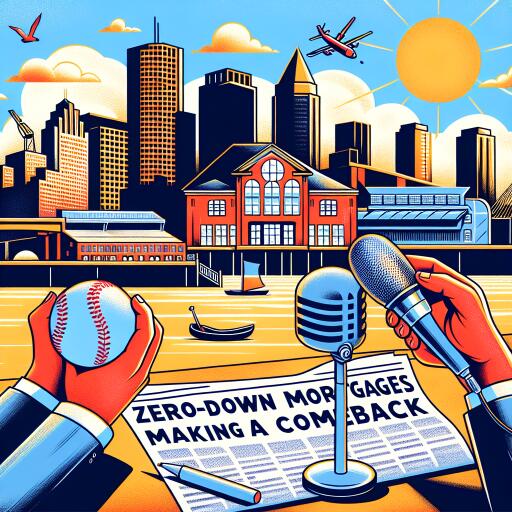Zero-Down Mortgages Are Making A Comeback
A revolutionary zero-percent down mortgage program has recently been launched, aiming to dismantle the towering barrier of hefty down payments that hinder many Americans from purchasing their dream homes. The initiative was introduced by United Wholesale Mortgage (UWM), one of the largest mortgage lenders in the nation. While the program offers a beacon of hope for many potential homeowners, it also stirs concerns among experts about the potential repercussions on the housing market and the financial wellbeing of consumers.
A Glimmer of Opportunity for Homebuyers
UWM’s unique approach to home financing eliminates the need for homebuyers to provide a down payment. Qualifying buyers will be able to finance 97% of their home’s value through a primary mortgage while the remaining 3%, up to $15,000, will be covered by a secondary mortgage. This secondary loan does not accrue interest; however, it must be repaid in full once the home is sold, the primary mortgage is settled, or if the homeowner decides to refinance.
The program targets first-time buyers and individuals whose income does not exceed 80% of the median income in their area. According to UWM, this opens up an unparalleled opportunity for those who dream of homeownership but are barred by the initial financial hurdle of down payments.
Risks and Concerns
Despite the appeal, the program’s structure raises concerns. Starting homeownership with zero equity means buyers are immediately vulnerable to market downturns, putting them at risk of becoming “underwater” on their mortgages should housing prices fall. This precarious position could lead to financial distress if homeowners need to sell in an unfavorable market, potentially leading to defaults and foreclosures reminiscent of the subprime mortgage crisis of 2008.
Additionally, tying homeowners to potentially high-interest rates poses another concern, particularly if the Federal Reserve adjusts base rates downwards. Homeowners may find refinancing out of reach if they can’t cover the balloon payment on the second mortgage, trapped by a rate environment that no longer reflects the market.
Alternatives and Precautions
It’s worth noting that other zero-down mortgage options exist, including programs designed by Bank of America for first-time buyers in certain communities and government-backed USDA and VA loans. These programs reflect a growing trend to make homeownership more accessible without the traditional down payment.
Experts emphasize the importance of understanding the terms and conditions of these mortgage offers. Sound advice for potential borrowers is to carefully consider how they plan to address the second mortgage’s repayment before locking themselves into a loan agreement that might not suit their long-term financial health.
Proceeding with Caution
While UWM asserts confidence in their vetting process, guaranteeing the quality of the loans issued, the echoes of past financial crises serve as a sobering reminder of what can happen when homeowners are overleveraged. The landscape of lending has indeed changed since the 2008 crisis, with more stringent standards in place, but the economic vulnerability of low to median income borrowers who cannot afford down payments still exists.
This reintroduction of zero-down mortgages could indeed provide a lifeline to prospective homeowners. However, it also necessitates a careful reassessment of lending practices and consumer education to ensure the homeownership dream does not devolve into a financial nightmare for some.
Conclusion
As zero-down mortgage plans gain traction, aligning a dream of homeownership with financial prudence becomes more crucial than ever. As such, these programs should be navigated with cautious optimism, keeping an eye on broader economic indicators and personal financial health.
